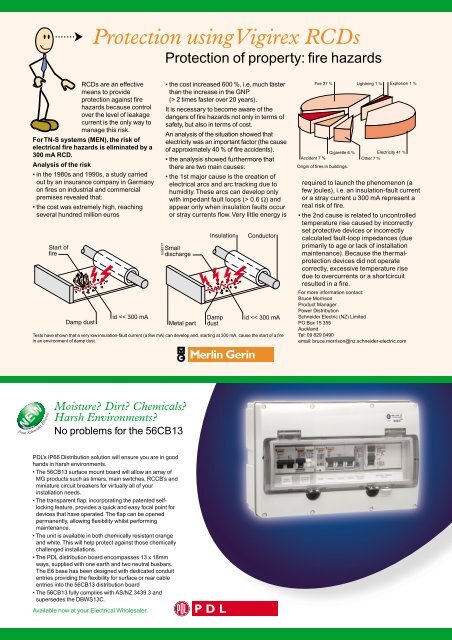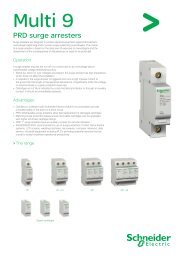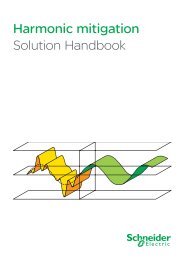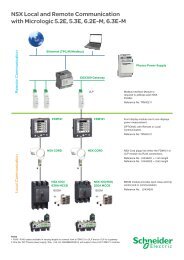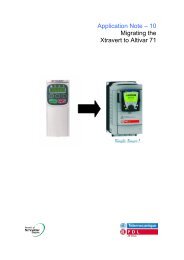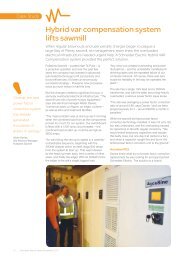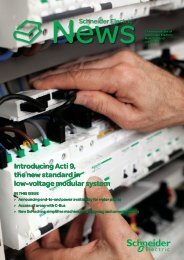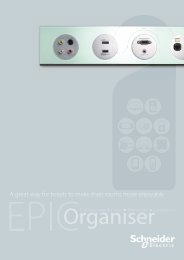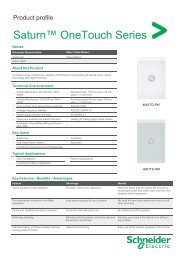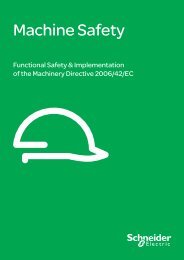Prisma Plus - error
Prisma Plus - error
Prisma Plus - error
You also want an ePaper? Increase the reach of your titles
YUMPU automatically turns print PDFs into web optimized ePapers that Google loves.
RCDs are an effective<br />
means to provide<br />
protection against fire<br />
hazards because control<br />
over the level of leakage<br />
current is the only way to<br />
manage this risk.<br />
For TN-S systems (MEN), the risk of<br />
electrical fire hazards is eliminated by a<br />
300 mA RCD.<br />
Analysis of the risk<br />
• in the 1980s and 1990s, a study carried<br />
out by an insurance company in Germany<br />
on fires on industrial and commercial<br />
premises revealed that:<br />
• the cost was extremely high, reaching<br />
several hundred million euros<br />
PDL’s IP66 Distribution solution will ensure you are in good<br />
hands in harsh environments.<br />
• The 56CB13 surface mount board will allow an array of<br />
MG products such as timers, main switches, RCCB’s and<br />
miniature circuit breakers for virtually all of your<br />
installation needs.<br />
• The transparent flap, incorporating the patented selflocking<br />
feature, provides a quick and easy focal point for<br />
devices that have operated. The flap can be opened<br />
permanently, allowing flexibility whilst performing<br />
maintenance.<br />
• The unit is available in both chemically resistant orange<br />
and white. This will help protect against those chemically<br />
challenged installations.<br />
• The PDL distribution board encompasses 13 x 18mm<br />
ways, supplied with one earth and two neutral busbars.<br />
The E6 base has been designed with dedicated conduit<br />
entries providing the flexibility for surface or rear cable<br />
entries into the 56CB13 distribution board<br />
• The 56CB13 fully complies with AS/NZ 3439.3 and<br />
supersedes the DBWS13C.<br />
Available now at your Electrical Wholesaler.<br />
Protection using Vigirex RCDs<br />
Protection of property: fire hazards<br />
• the cost increased 600 %, i.e. much faster<br />
than the increase in the GNP<br />
(> 2 times faster over 20 years).<br />
It is necessary to become aware of the<br />
dangers of fire hazards not only in terms of<br />
safety, but also in terms of cost.<br />
An analysis of the situation showed that<br />
electricity was an important factor (the cause<br />
of approximately 40 % of fire accidents).<br />
• the analysis showed furthermore that<br />
there are two main causes:<br />
• the 1st major cause is the creation of<br />
electrical arcs and arc tracking due to<br />
humidity. These arcs can develop only<br />
with impedant fault loops (> 0.6 Ω) and<br />
appear only when insulation faults occur<br />
or stray currents flow. Very little energy is<br />
Tests have shown that a very low insulation-fault current (a few mA) can develop and, starting at 300 mA, cause the start of a fire<br />
in an environment of damp dust.<br />
Moisture? Dirt? Chemicals?<br />
Harsh Environments?<br />
No problems for the 56CB13<br />
Origin of fires in buildings.<br />
required to launch the phenomenon (a<br />
few joules), i.e. an insulation-fault current<br />
or a stray current u 300 mA represent a<br />
real risk of fire.<br />
• the 2nd cause is related to uncontrolled<br />
temperature rise caused by incorrectly<br />
set protective devices or incorrectly<br />
calculated fault-loop impedances (due<br />
primarily to age or lack of installation<br />
maintenance). Because the thermalprotection<br />
devices did not operate<br />
correctly, excessive temperature rise<br />
due to overcurrents or a shortcircuit<br />
resulted in a fire.<br />
For more information contact:<br />
Bruce Morrison<br />
Product Manager<br />
Power Distribution<br />
Schneider Electric (NZ) Limited<br />
PO Box 15 355<br />
Auckland<br />
Tel: 09 829 0490<br />
email: bruce.morrison@nz.schneider-electric.com


